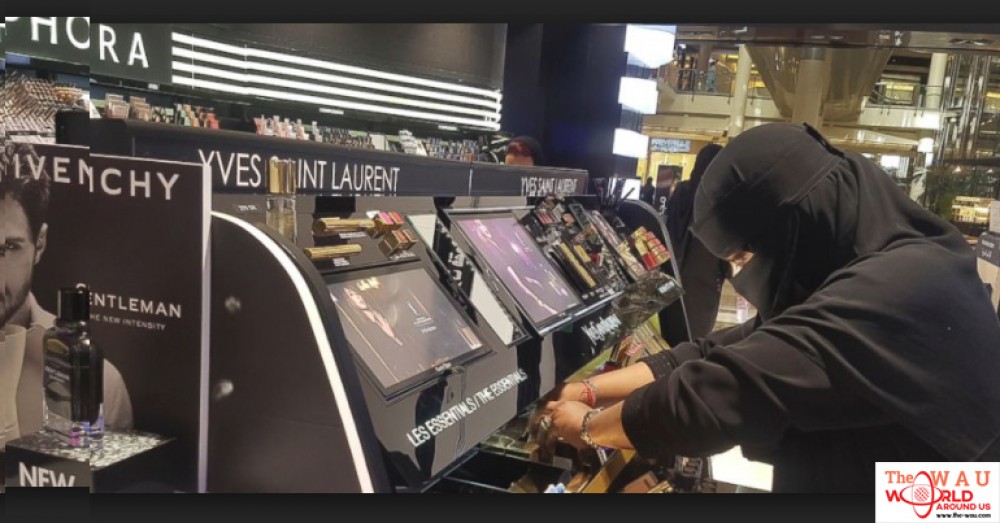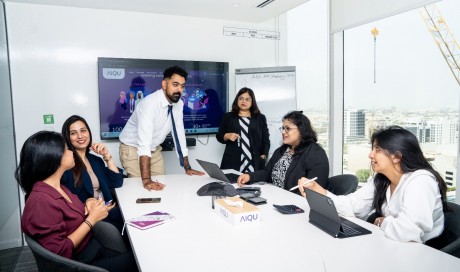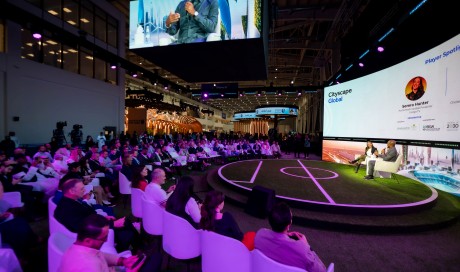Green lipstick, blue lipstick and 40 shades of foundation to choose from are just some of the reasons 18-year-old Shahad al-Qahtani is excited about superstar Rihanna's make-up line debut in Saudi Arabia.
Rihanna, known worldwide for her chart-topping songs and daring, provocative style, is wildly popular among the Saudi women coveting her new make-up line called Fenty. Rihanna and other celebrities like Kim Kardashian who experiment boldly with their hair colour, make-up and clothes have become household names in Saudi Arabia, where fans can follow their every move on social media sites like Instagram and Snapchat.
Their styles, however, stand in stark contrast to how most Saudi women dress in public. Many cover their faces and hair with black veils. Women in Saudi Arabia must also wear long, loose black robes, known as abayas, over their clothes in public.
"I've tried her brand in Dubai, and I came here to buy the things that were sold out there," al-Qahtani said as she selected products to put in her shopping basket from Rihanna's Fenty line, which launched Thursday in Sephora make-up stores across the kingdom.
Al-Qahtani said she likes to experiment with her style and bold makeup choices at parties and weddings where women are segregated from men.
Make-Up Sales Biggest Spends
Even though most women will cover their face and hair in public, make-up sales are among the biggest spends among Saudi women. This is in part because of the increasing number of Saudi women joining the workforce who now have their own salaries from which to spend.
The kingdom's 32-year-old crown prince, Mohammed bin Salman, has also pushed through a number of sweeping social reforms in recent months, curbing the influence of ultraconservatives. Religious police, for example, no longer patrol malls looking for signs of nail polish or women's faces showing.
Unlike in many Western countries where more natural make-up looks are en vogue, women across Arab Gulf countries often lean toward bright, eye-catching make-up trends and accessories that offset the utilitarianism of black veils and abayas.
"As Gulf women, we love beautiful things. We don't need an occasion for it," said Najla Sultan bin Awwad, a mother of two in her 30s who started working for the first time last year at Sephora.
"We're in an era where women are basically not even leaving the house without fake eyelashes on. We've started opening up in the Gulf, and you'll see women who cover their faces putting on coloured contact lenses, eyelashes, and drawing their eyeliner the way they want," said bin Awwad, who spoke from behind a face veil that showed her eyes rimmed with smoky eyeshadow.
Before working at Sephora, she said she used to spend nearly all her money on make-up.
"The reason my husband agreed to me working is because he sees how much I love make-up and how much I used to spend on it," she said, laughing.
According to marketing research group Euromonitor International, rising employment rates, especially among women, have increased the affordability of beauty and personal care products and encouraged consumers to spend more. Retail sales in Saudi Arabia on make-up rose from US$410 million in 2012 to US$576 million last year, said the report.
In 2012, the late King Abdullah implemented a decision to allow women to work in cosmetic and lingerie stores. It paved the way for thousands of Saudi women to work. The decision was largely supported by the Saudi public, though ultraconservative clerics criticised the measure and said allowing women to work in stores would open the door to lasciviousness and sin.
Previously, women who wanted to buy make-up or lingerie in Saudi Arabia would have to purchase these often personal and intimate products from an all-male staff of mostly lower-wage workers from the Philippines.
It created for awkward encounters when, for example, a woman wanted to try on a new eyeshadow or foundation but couldn't lift her face veil in front of the salesman or allow him to touch her skin due to the country's Islamic mores governing gender segregation. Sifting through lingerie pieces and having a male employee suggest the right bra size wasn't any easier
Share This Post















